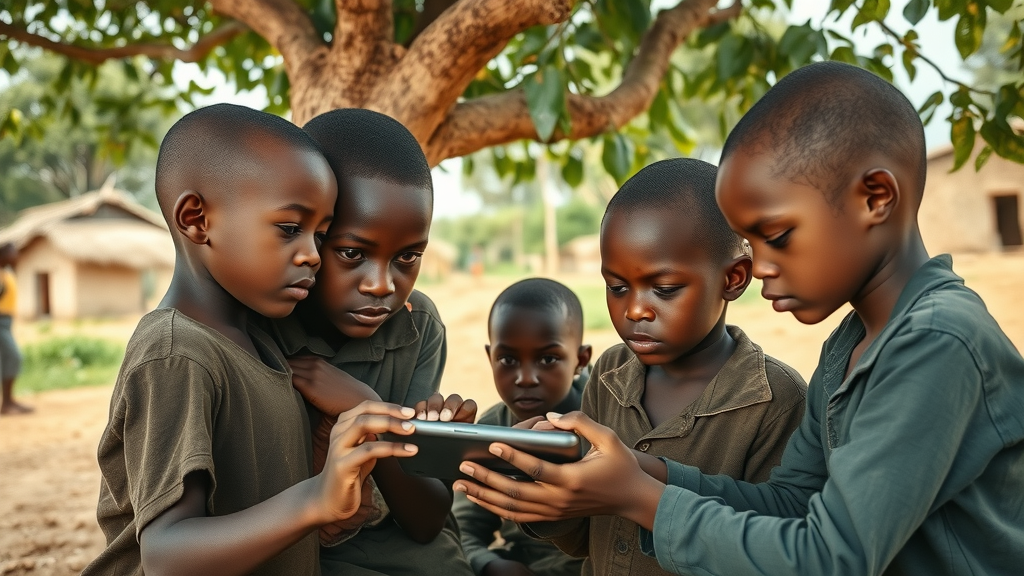Did you know that as of 2023, less than 40% of African students have consistent access to online learning? Despite this, digital education Africa is on the brink of a dramatic transformation. From bustling tech hubs in Nairobi to resourceful villages in Ghana, the continent is reinventing education through innovation, resilience, and strategic partnerships. In this article, we’ll explore how cutting-edge technology, collaborative efforts, and a bold vision are poised to unlock rapid progress—empowering Africa’s next generation with the digital skills they need to thrive in a changing world.
Exploring Digital Education Africa: Why the Continent’s Future Depends on Innovation
The future of education in Africa rests heavily on how swiftly and effectively the continent can embrace innovation in digital learning. Digital education Africa is rapidly evolving from a luxury reserved for urban elite to a necessity impacting millions across both city centers and rural areas. These advances aren’t just about introducing technology ; they represent a shift towards more accessible, scalable, and relevant education systems that bridge existing gaps. By harnessing digital tools, African countries aim to leapfrog traditional models and build a foundation that prepares students for the digital economy.
By prioritizing digital skills and growing investment in mobile technology, east Africa is emerging as a prime example of how innovative solutions can drive inclusive growth. Projects in Kenya, Rwanda, and Nigeria highlight how partnerships between government, private sector, and international donors can expand internet access and open up learning platforms to students previously left behind. The use of digital learning platforms not only expands reach but also brings personalized, adaptive instruction that aligns with workplace needs and local context.
As of 2023, less than 40% of African students have consistent access to online learning – yet the landscape is transforming at an unprecedented pace.

The Transformation of Digital Education in Africa: Shaping a New Era
From Traditional Classrooms to Digital Learning Platforms
The journey from chalkboards to digital learning platforms in African classrooms marks a revolutionary change in how knowledge is shared and absorbed. Traditionally, barriers like overcrowded classrooms, outdated materials, and teacher shortages plagued the education system in many regions. Today, the adoption of e-learning tools and innovative learning apps, especially in places like east Africa and south Africa , has transformed the learning experience for thousands. Interactive apps, multimedia lessons, and blended curricula are replacing one-size-fits-all instruction, providing responsive, relevant content that’s tailored to diverse learning needs.
Technology isn’t just about replacing textbooks with tablets. It’s also redefining what’s possible, offering students in rural areas access to quality content and expert mentorship once reserved for urban centers. New digital tools and virtual classrooms foster engagement, encourage creative problem-solving, and allow for continuous updated curriculum. This shift is building the digital literacy and critical thinking necessary for the next wave of African job creation and entrepreneurship.
How Digital Transformation Is Reshaping Education in Africa
The rapid digital transformation that’s reshaping digital education in Africa is catalyzed by factors such as increased smartphone penetration, local innovation, and bold government initiatives. Emerging tech hubs in east Africa are pioneering new e-learning solutions, coding bootcamps, and grassroots digital skills workshops, changing how students, teachers, and administrators engage with content. The shift goes beyond mere digitization; it involves developing entire ecosystems of support, from teacher training programs to locally relevant learning tools, all aimed at closing the digital divide.
- Importance of digital skills in modern African economies
- Emerging tech hubs in East Africa and their impact
- Case studies of digital learning successes
| Region | Adoption Rate (%) | Key Drivers | Barriers |
|---|---|---|---|
| East Africa | 52 | Government Policies | Infrastructure Gap |
| West Africa | 44 | Private Sector Investment | Internet Cost |
| North Africa | 61 | International Aid | Regulatory Issues |
| Southern Africa | 67 | High Smartphone Penetration | Rural Connectivity |
Key Drivers of Digital Transformation in African Education
World Bank Initiatives Catalyzing Digital Skills Development
The World Bank has emerged as a pivotal supporter of digital transformation in African education, spearheading initiatives that address gaps in digital literacy, infrastructure, and teacher training. By financing projects in nations like Kenya, Ghana, and Nigeria, the World Bank provides critical resources: from internet connectivity in schools to curriculum designed for the digital age. These large-scale efforts help bridge the digital divide and ensure that learners in both urban and rural environments can benefit from modern digital learning tools .
Key projects, such as digital hub construction and teacher professional development programs, are central to building sustainable ecosystems of digital education. With goals that include upskilling youth for remote work and increasing job creation, World Bank collaborations ensure that technology integration is both effective and equitable.
Role of International Partnerships in Scaling Digital Education Africa
International partnerships are transforming how digital education Africa is scaled and implemented. Collaborations between governments, NGOs, and technology firms have fueled innovative pilot programs and rapid deployment of digital learning solutions. For example, private-public partnerships in east Africa and the democratic republic of Congo have connected students to global resources, provided affordable devices, and supported teacher training in digital tools. Such initiatives demonstrate the immense potential of shared expertise and funding in expanding the continent’s digital learning footprint.

Local Startups and the Digital Learning Revolution
Local startups are at the heart of the digital learning revolution. The rise of homegrown e-learning apps and platforms is a testament to African entrepreneurs’ creativity. Developers are designing tools that address real challenges—such as language diversity and low-bandwidth environments—making them more accessible to users in rural areas. Startups like Eneza Education and uLesson are reaching students in places where traditional schools struggle to operate, making learning relevant, inclusive, and engaging.
- Impact of education technology investments
- Revolutionary e-learning apps shaping digital education in Africa
- Cross-sector policy frameworks supporting change
Persistent Challenges Facing Digital Education Africa
Infrastructure Gaps and Digital Divide
Despite promising advances, critical challenges persist—most notably the divide between connected and disconnected communities. Basic infrastructure, such as reliable electricity and high-speed internet, is still lacking in many regions. Students in rural areas may have limited or no access to the digital technologies and learning platforms available to their urban peers. The result is an uneven educational landscape where digital opportunities can reinforce rather than close existing inequalities. The challenge is not only to provide access but also to ensure digital inclusion for marginalized and remote populations across african countries .
Addressing these infrastructure gaps demands ongoing investment from both the public and private sectors, greater innovation in low-cost technologies, and the development of creative solutions that leverage mobile networks and offline learning resources.
Socioeconomic Barriers to Digital Learning
Socioeconomic factors remain a significant hurdle in achieving truly inclusive digital education. Many families simply cannot afford personal devices or sustained internet subscriptions, leaving students without the essential digital tools for learning. This reality is especially pronounced in the democratic republic of Congo and other countries where poverty rates are high and access to education is already a challenge. Tackling these barriers will require broad investment in affordable devices, local language learning content, and community-based digital literacy initiatives.

Tackling the Quality Gap in Digital Education Content
Another persistent challenge is the quality and relevance of digital content. Many available resources are not tailored to African curriculums, local languages, or cultural contexts. This gap means that even when access is gained, the learning experience may not fully meet students’ needs. Initiatives focused on localizing content, creating inclusive tools, and engaging educators in content development are critical for closing this gap and ensuring that digital platforms foster meaningful skills development.
- Limited internet availability across rural Africa
- Device affordability
- Language accessibility and inclusivity issues
Innovative Solutions Accelerating Digital Learning in Africa
Mobile-First Strategies Powering Digital Skills in Remote Areas
Mobile phones have become the gateway to digital learning in Africa. Recognizing the widespread use of mobile technology—even in remote locations—innovators are creating mobile-first curriculum, interactive apps, and SMS-based lessons that require minimal bandwidth. These solutions have given rise to micro-learning and self-paced study habits, empowering young people to learn anytime, anywhere. Case studies from east Africa show that with the right support, mobile education is increasing digital literacy, expanding outreach, and producing measurable improvements in student outcomes.

Open Educational Resources and Community-Based Platforms
The open education movement is gaining momentum with the rise of freely available digital resources and community-driven platforms. African educators and NGOs curate open educational resources that fill gaps in local content, while online forums foster peer support and teacher collaboration. Community-based digital hubs not only provide access to devices and WiFi but also serve as centers for innovation, upskilling, and leadership development. By removing cost barriers and encouraging community ownership, these platforms are unlocking new models of inclusive digital learning.
"The strength of digital transformation in education lies in collective adaptation and persistent vision."
World Bank and Public-Private Partnerships: Accelerating Progress in Digital Education Africa
Scaling Access Through Strategic Investments
Strategic investments from both the World Bank and private sector partners are bridging digital infrastructure gaps and scaling programs that might otherwise remain pilot projects. These partnerships have led to the establishment of ‘smart’ classrooms, enabled mass device distribution, and funded intensive teacher digital upskilling in countries like Ghana and Kenya. Through data-driven approaches, stakeholders can identify what works, track progress, and rapidly scale successful models across diverse educational environments.

Measuring Impact: Data-Driven Approaches for Digital Learning
Data analytics enable education leaders to measure impact and make informed decisions about scaling solutions. From analyzing student engagement on learning platforms to monitoring improvements in digital skills, real-time data helps optimize investments and target resources strategically. This approach ensures accountability and supports evidence-based policy development for digital education in Africa.
| Program | Country | Impact | Supporters |
|---|---|---|---|
| DigiSchool | Kenya | 100,000+ students | World Bank, Safaricom |
| eLearn Africa | Nigeria | Upgraded 500 schools | UNESCO, Google |
| Virtual Academy | South Africa | Low-income access | Local NGOs |
| SmartClassrooms | Ghana | Rural reach | MTN, World Bank |
| OpenClass | East Africa | Language diversity | Microsoft, Educational NGOs |
The Power of Digital Skills: Preparing Africa’s Next Generation
Adapting Curricula to the Digital Economy
To prepare students for evolving markets, schools are adapting curricula to emphasize digital skills such as coding, data analysis, and cloud computing. Partnerships with tech firms and local employers help ensure that courses are relevant to real-world demands and future job creation. Certification programs and remote learning modules enable youth to access global opportunities, regardless of geographic barriers. This responsive approach to curriculum design is critical to empowering Africa’s youth with the skills required in a digital economy.
Training Teachers for Effective Digital Education
Effective teacher training is fundamental to successful education transformation. Across african countries , governments are investing in digital skills certification, professional development workshops, and train-the-trainer programs. These help teachers gain confidence with new technologies and pedagogies, so they can deliver engaging and effective online and hybrid lessons. In turn, well-trained educators become change agents, spreading digital literacy and encouraging students to pursue advanced skills.
- Certification programs in digital skills
- Upskilling youth for remote work
- Government-led digital learning workshops
What’s Next for Digital Education Africa: Vision for 2030 and Beyond
Predictions: Digital Transformation at Scale
By 2030, digital transformation will become the backbone of education in Africa. Widespread adoption of learning platforms, expanded digital infrastructure, and increasing international partnership are expected to dramatically close the digital divide. Ongoing investment in local content, teacher training, and mobile-first tech will see a new generation of African innovators and problem-solvers making their mark on the global stage.
Envisioning an Equitable Digital Learning Landscape
The vision for the future extends beyond access—aiming for a truly equitable learning landscape. A focus on inclusivity promises to dismantle barriers around gender, location, and income. Governments, NGOs, and communities will need to collaborate to ensure that even the most marginalized children have access to transformative digital learning opportunities. Scaling innovative pilots and storing best practices institutionally will pave the way for educational equity across the continent.
"By investing in digital transformation, Africa holds the keys to a knowledge-driven future."
Which country in Africa is the most digitalized?
A Look at Digital Education in East Africa and Beyond
While several African countries are making significant strides in digital education, East Africa , particularly Kenya, often leads due to robust investments in digital infrastructure, supportive government policies, and a flourishing tech startup scene. Programs like DigiSchool have propelled Kenya to the forefront, delivering digital devices, interactive apps, and reliable internet connectivity to schools nationwide. Rwanda and South Africa also stand out, investing heavily in smart classrooms, teacher upskilling, and local content development. With digital learning becoming a focal point of education reforms, these nations serve as models for others looking to accelerate progress.

What are the digital problems in Africa?
Challenges Hindering Digital Education Africa
The main digital problems in Africa include insufficient infrastructure, limited internet access, high costs of devices, language barriers, and a lack of locally relevant content. For many students in rural and underserved communities, regular and affordable access to digital devices and reliable connectivity is a persistent challenge. Overcoming these obstacles requires regional collaboration, innovative funding models, and a sustained focus on low-bandwidth, mobile-friendly solutions that address these unique barriers.
What are the challenges of e learning in Africa?
E-Learning Barriers in Digital Education Africa
E-learning in Africa faces hurdles such as intermittent power supplies, untrained educators, limited device affordability, and poor connectivity. Socioeconomic gaps also mean that some students lack supportive home environments for digital learning, while the variety of local languages can complicate content delivery. These challenges—though substantial—are gradually being addressed through open educational resources, public-private investment in teacher training, and mobile-based learning tools designed expressly for African contexts.
What is the main problem with the African education system?
Underlying Barriers Beyond Digital Education Africa
The main problem with the African education system is a combination of resource scarcity, underqualified teachers, overcrowded classrooms, and infrastructure shortfalls that predate the digital era. While technology presents powerful opportunities for change, these foundational issues mean that successful digital transformation must involve systemic reforms, expanding access, and strengthening foundational learning standards, alongside the rollout of new learning technologies.
Frequently Asked Questions: Clarifying the Realities of Digital Education Africa
- How can governments boost access to digital learning in remote regions? By investing in rural connectivity, subsidizing device costs, expanding infrastructure, and supporting digital hubs, governments can bridge the access gap in remote communities.
- What are the most in-demand digital skills for African students today? Coding, basic data analysis, cybersecurity, digital marketing, and online communication skills are among the most sought-after skills in Africa’s rapidly evolving job market.
- Is digital education Africa feasible for students without personal devices? Yes, through shared devices at community hubs, schools, or local libraries, along with mobile-based and offline learning resources, students can still benefit from digital programs.
- How do gender and regional disparities affect digital transformation in education? Girls and students in remote or impoverished areas often face additional barriers to digital learning, but targeted initiatives and inclusive policies can help mitigate these disparities.
Crucial Strategies to Accelerate Digital Transformation in African Education
- Increase public-private funding initiatives
- Promote localized content development
- Expand teacher and administrator training in digital education Africa
- Leverage mobile-first and low-bandwidth learning tools
- Encourage regulatory harmonization across African countries
Lessons from Leading Innovators in Digital Learning Across Africa
- DigiSchool Kenya’s rural success stories
- Rwanda’s smart classroom model
- Ghana’s blended learning curriculum adoption
- Tunisia’s government-owned e-learning portal
- South Africa’s inclusive tech learning hubs
Practical Steps: How Stakeholders Can Advance Digital Education Africa
- Investing in teacher digital skills certification
- Building community-based digital hubs
- Developing affordable hardware partnerships
- Promoting data-driven policy formulation
Key Takeaways for Shaping the Digital Future of Education in Africa
- Rapid progress is possible through innovation and inclusive strategies
- Partnerships (e.g., World Bank, tech firms) will catalyze advancement
- Bridging infrastructure and skills gaps remains the top priority
Your Role in Accelerating Digital Education Africa’s Transformation
Whether you’re an educator, policymaker, parent, or student, your voice and action can help shape the future of digital education Africa . Advocate for inclusive policies, invest in your own digital skills, support local innovators, and champion equal access. Together, we can unlock Africa’s limitless educational potential.
 Add Row
Add Row  Add
Add 



Write A Comment